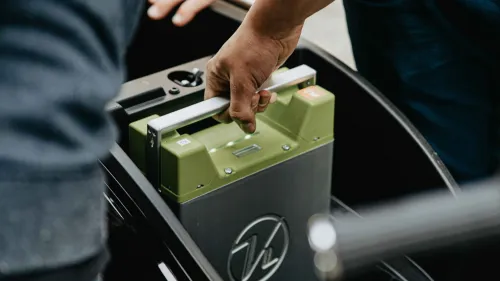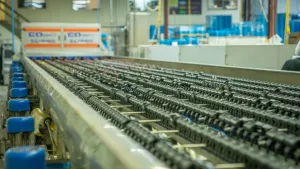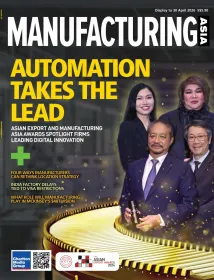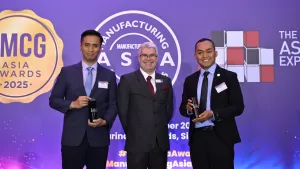
Falcon Chan joins Made in Hong Kong and Designed in Hong Kong Awards 2021 judges panel
Hong Kong needs to seize the opportunity to establish leadership in the nascent field of AI-driven advanced manufacturing, says Deloitte China Partner.
Falcon Chan is a Partner based in Hong Kong and leads Deloitte China's Strategy, Analytics and M&A consulting services in the Southern region. He also serves as the Hong Kong Office Champion supporting the firm's talent, diversity and inclusion agendas.
Falcon has extensive transaction advisory and strategy consulting experience, working with multinational corporations, private equity funds, startups and conglomerates in Asia. His primary focus includes market entry and expansion strategy, corporate venturing, innovation ecosystems, M&A due diligence, merger integration and enterprise digital transformation.
As one of the judges at the Made in Hong Kong and Designed in Hong Kong Awards 2021, Hong Kong Business sat down with Falcon as he discussed the opportunities that Hong Kong should seize with digital transformation and disruptive forces impacting the manufacturing sector.
How is digital transformation affecting the manufacturing sector, and what is the implication for Hong Kong in the drive for re-industrialisation and integration in the Greater Bay Area?
The concept of digitizing everything is not new. Recent advances in artificial intelligence, IoT, machine learning, automation and other advanced technologies have profound impacts on the way consumer products are designed and manufactured. The challenge is in activating the next stage–changing how we think, train and use data to create sustainable value.
If we look at traditional supply chains, they focus mainly on the four Vs (volume, variety, velocity and volatility) to meet cost, quality and efficiency metrics. While these priorities are not likely to change, there is increasing urgency for manufacturers to elevate performance and resilience with capabilities enabled by digital technologies.
Industry 4.0 presents many opportunities for organisations to use advanced technologies across their entire value chain. This not only drives operational excellence but innovation-led growth. For instance, companies can take advantage of network-based, data-driven, autonomous and cognitive digital and physical technologies to create truly innovative business solutions – rather than using technology to pursue the same old ways of doing business.
Hong Kong, with its advanced R&D infrastructure and strategic location as the gateway to China and Asia, now lies at a critical juncture. We need to seize this generational opportunity to establish leadership in the nascent field of AI-driven manufacturing. To this end, the Government has been promoting re-industrialisation as a focus of its innovation and technology policy. The InnoHK research clusters, emerging development of the Northern Metropolis, and the recent re-positioning of three industrial estates as "InnoParks" are all big strides forward.
Beyond market access, the Greater Bay Area doubles as a key collaboration platform. Manufacturing capacity in the nine cities of Guangdong province can complement the high-end upstream research of Hong Kong. We should proactively work with Guangzhou and Shenzhen to form an ecosystem of “frontend research, backend production," with Hong Kong focusing on R&D, intelligent manufacturing and global distribution of final products.
What are the challenges that the manufacturing sector experienced during the pandemic? How do you see these challenges as having a lasting impact in the industry and can companies adapt?
In the past decade, we have witnessed many global supply chain disruptions-natural disasters, the US-China trade war, the COVID-19 pandemic and, more recently, blockage of the Suez Canal. The push for digitisation and supply chain reshoring started long before COVID-19, but accelerated during the pandemic as the importance of supply chain resilience came to the forefront.
A recent global Deloitte survey found that more than 80% of industries experienced supply chain disruptions due to the pandemic, and 75% of companies planned to accelerate digitisation by building smart factories closer to home locations, or customers' points of need. The same study found that manufacturers embracing "digital" have seen on average a 10% increase in production output, 11% increase in capacity utilisation, and 12% increase in labour productivity. Smart manufacturing capabilities can also accelerate speed-to-market by reducing innovation development time by as much as 30%.
Over the next 12 to 18 months, we expect to see more manufacturers and retailers optimize their ecosystems for resilience and risk, and transform their supply chains from traditional cost centres to value-driving operations. There remains, however, companies that focus just on bouncing back to the status quo. This could leave them vulnerable to competitive pressure as they lag behind in their digital journeys. It is more critical now than ever to focus on customer, product and service innovation, and adapt to new ways of working in the post-pandemic world.
Change is hard. Transformation will not happen overnight, nor will be building the flexibility, transparency and resilience to weather future disruptions. But the time to start is now. COVID-19 paved the way for a new, uncharted phase of globalisation, interdependency and vulnerability.
As the business operations slowly return to normal, where are the opportunities for entrepreneurs and manufacturers in Hong Kong?
The pandemic has highlighted the benefits of having a robust, innovation-driven manufacturing industry in Hong Kong. Local enterprises and those with manufacturing bases in mainland China continue to face challenges from the global economic situation to the rise of operating costs. However, opportunities abound.
The Government should stimulate I&T growth by selecting industries to build core technological competence. There will be big markets for green technology, food processing, semiconductor and medical biotechnology, amongst others, in the future. The city's biotech industrial sector also has huge potential, as Hong Kong is the world's second-largest biotech IPO fund-raising centre. As the Hong Kong brand is also well-known amongst consumers in the GBA, Hong Kong enterprises should leverage this to attract more customers in the region and in turn participate in the nation's "internal circulation" drive. We also need to bridge the technology commercialisation gap, by seeking support from the central government and relevant departments to consolidate the Greater Bay Area’s technology resources and climb up the R&D value chain.
For manufacturers and entrepreneurs, many are in the process of upgrading production technologies or diversifying their production bases. As organisations evaluate digital and innovation investments, there are several keys to success for consideration:
- Deploy AI strategically across the value chain: Assess how AI can drive value in both greenfield and brownfield scenarios – from fulfilment to planning, product design, production, remote monitoring and customer service.
- Unlock data interoperability: Data becomes more valuable when aggregated, mined for insights, and disseminated in real-time across an ecosystem of stakeholders
- Fortify the digital supply network: Supply chains need to transform to a dynamic, interconnected system that readily incorporates ecosystem partners. This also opens doors to M&A, strategic alliances and partners.
- Integrate sustainability and climate resilience to digitisation and localization strategies. These are not afterthoughts or just compliance mandates.
- Build trust. Focus on data management issues and cyber risk management whether retrofitting or building new solutions to ensure trust with customers, employees, suppliers and other stakeholders.
The time is ripe to reinvigorate our local industry and diversify the economy by encouraging manufacturers to adopt new technologies. The future of manufacturing is no longer labour-intensive, but one anchored in data, technology and innovation.
What key criteria did you consider in selecting the winners of the Designed and Made in Hong Kong Awards?
It is an honour to be alongside the esteemed industry panellists for the Designed and Made in Hong Kong Awards programme. In evaluating this year's exceptional entries, I am inspired by the boundless creativity, resourcefulness and ingenuity of Hong Kong innovators.
They exemplify what I like to call "Designed and Made for Good," an intersection of sustainable development and positive societal impact to communities. Many entries also contribute to tackling the megatrends of our times – from the pandemic to sustainability and climate change.
Hong Kong continues to be a haven where we innovate, design, and make positive change happen. Our local brand has long conveyed quality, trust and resilience. I stand with you in celebrating the remarkable achievements of all the winners. Onward and upward!
















